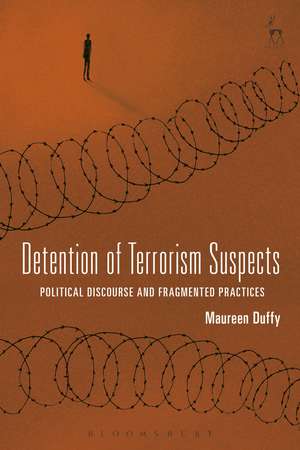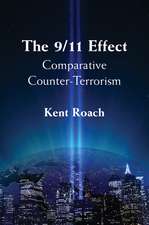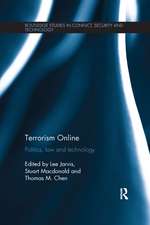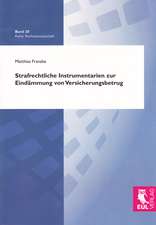Detention of Terrorism Suspects: Political Discourse and Fragmented Practices
Autor Dr Maureen Duffyen Limba Engleză Paperback – 24 iun 2020
| Toate formatele și edițiile | Preț | Express |
|---|---|---|
| Paperback (1) | 272.23 lei 6-8 săpt. | |
| Bloomsbury Publishing – 24 iun 2020 | 272.23 lei 6-8 săpt. | |
| Hardback (1) | 570.43 lei 6-8 săpt. | |
| Bloomsbury Publishing – 7 feb 2018 | 570.43 lei 6-8 săpt. |
Preț: 272.23 lei
Preț vechi: 348.96 lei
-22% Nou
Puncte Express: 408
Preț estimativ în valută:
52.09€ • 54.54$ • 43.21£
52.09€ • 54.54$ • 43.21£
Carte tipărită la comandă
Livrare economică 10-24 aprilie
Preluare comenzi: 021 569.72.76
Specificații
ISBN-13: 9781509939541
ISBN-10: 1509939547
Pagini: 320
Dimensiuni: 156 x 234 x 22 mm
Greutate: 0.44 kg
Editura: Bloomsbury Publishing
Colecția Hart Publishing
Locul publicării:London, United Kingdom
ISBN-10: 1509939547
Pagini: 320
Dimensiuni: 156 x 234 x 22 mm
Greutate: 0.44 kg
Editura: Bloomsbury Publishing
Colecția Hart Publishing
Locul publicării:London, United Kingdom
Caracteristici
An important contribution to the literature on the development of counter-terrorist strategies in the West following the 9/11 terrorist attacks in New York.
Notă biografică
Maureen Duffy is Assistant Professor of Law at the University of Calgary.
Cuprins
Part I: Political Discourse1. Language Manufactures Truth: The Power of Labels I. The Beginning of the Conversation: Narratives Wield Great Power II. Whoever Prevails with Duelling Labels Wins the Day: 'Muslim Ban' or 'Extreme Vetting'? III. Motive and Omar Mateen: Immutable Characteristics Can Lead to a Label that Could Obscure True Motive and Undermine Systemic Responses IV. 'A Rose by Any Other Name .': Strategically Naming an International 'Terrorist' Group is Key to the Narrative V. Conclusion 2. Breaking Down and Reconstructing Discourse Can Reveal New Realities I. Introduction: Fractured Narratives and Manufactured Confusion II. The Same Scenario, or the Same Words, with Different Meanings for Different People III. An Example: Kafka and Shifting the Kaleidoscope IV. 'Deconstructing' Anti-terrorism Detention Discourse V. Deconstructing and Reconstructing the Post-9/11 Discourse Using Argumentation Theory VI. Against this Backdrop, Post-9/11 Terrorism Detention Discourse Successfully Involved the Use of Effective Argumentation Tools VII. Conclusion 3. Layers of Argumentation Tools and a Fractured Post-911 Narrative I. Introduction: How Threads of Perception Developed after 9/11 II. Manufacturing Confusion: Euphemisms Played a Key Role in Influencing Public Perception III. Forward-Looking Threat-Based Discourse Perpetuated Already Rattled Nerves and Made Governmental Initiatives More Persuasive in the US IV. A Fractured Narrative Arose After 9/11, as Demonstrated by One Conversation between Representatives of Branches of the US Government V. Conclusion Part II: Fragmented Practices4. Hasty Inductive Generalisation: The Problem with the Claim that the 9/11 Attacks Exposed a Need for New Detention Paradigms I. Crisis Shifts in Long-Standing Detention Paradigms Occurred after the 9/11 Attacks II. The 'Unprecedented' Nature of the 9/11 Attacks III. The 9/11 Attacks Led to a Claim of Presumptive Inadequacy of National Criminal Justice Systems in Certain Cases IV. Certain Commonalities Emerged across Jurisdictions Regarding Extraordinary Detention Practices V. Special Mechanisms that Bypassed the Criminal Justice System Entirely VI. Other Examples of Changes: Torture and Targeted Killings VII. Conclusion 5. False Premise: Non-citizens as the Terrorist 'Other' I. Many Post-9/11 Detention Changes Sprang from the False and Simplistic Idea that Terrorists were Non-citizens II. The Claimed Need to Protect 'Us' from 'the Other' III. The Othering before and after 9/11 was Directed between Organisations Like Al-Qaeda and those Claiming to Represent the West, Each Accelerating it against the Other IV. The Cycle of Othering that Led to the 9/11 Attacks Continued in Some of the National Responses to the Attacks V. The 'Other' Moves Forward as a Foundation for Extraordinary Terrorism Detention Practices VI. Conclusion: The False Premise of the Non-citizen Terrorist Other, which was Dominant in Post-9/11 Responses, Remains Foundational in Different Ways in Different Countries 6. False Dichotomies in the Narrative: The 'Either/or' Dilemma I. Binary Language in the Post-9/11 Narrative and How it Precluded Nuance that Might Have Led to Better Responses II. Incommensurability in Binary-Based Discourse: The False Dichotomy of Balancing Liberty and Security Dominated after 9/11 III. The Paradigm Fractures: The Misleading American Crime-or-War Detentions Debate IV. Terrorism Detentions: 'Everything Old is New Again'V. Conclusion: Deconstructing the Binaries Conclusion: Turning the Kaleidoscope I. The Conversation Continues: Can, or Should, the Fracturing in the Post-9/11 Terrorism Detention Narrative be Repaired? II. Changes to Political Discourse III. Fragmented Practices and Regrets IV. A Way Forward?
Recenzii
Duffy successfully crafts a comprehensive account of the problematic post-9/11 political discourse on detention . This book is an attractive volume for both theorists and practical observers of current detention practices.
By deconstructing the arguments that were made in the aftermath of 9/11, Professor Duffy provides us with a deeper and richer understanding of law's response to the challenges that terrorism presented . Professor Duffy's work should be useful not just in helping us understand the law's failures and successes with respect to terrorism, it should also help us more generally to understand the pressures that the rule of law necessarily faces in situations of crisis.
By deconstructing the arguments that were made in the aftermath of 9/11, Professor Duffy provides us with a deeper and richer understanding of law's response to the challenges that terrorism presented . Professor Duffy's work should be useful not just in helping us understand the law's failures and successes with respect to terrorism, it should also help us more generally to understand the pressures that the rule of law necessarily faces in situations of crisis.




